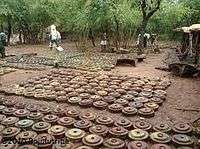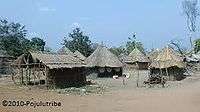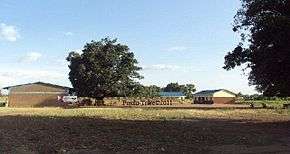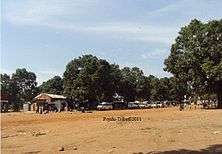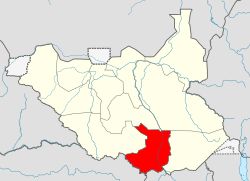Lainya County
Lainya is a county on the Yei Juba road in the Yei River State of South Sudan.[1] The county has been affected by the civil war between Sudanese People's Liberation Army/Movement (SPLA) and the National Congress Party (NCP) of the Sudanese government. Lainya had been bombed by planes and artillery of the Sudanese government against the SPLA/M rebels during the war.
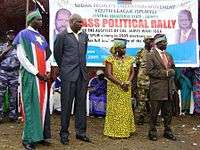 SPLA/M delegates waiting a gift from Lainya county Youths 2009 | |
| Total population | |
|---|---|
| Approximately 80,000 | |
| Languages | |
| Bari/Pojulu | |
| Religion | |
| Christianity, Traditional | |
| Related ethnic groups | |
| Nilotic peoples |
Background
The county of Lainya is located at the central region of central Equatoria State. Pojulu measuring 101 km from Juba and 60 km to Yei river county. Business people, tourists and all travelling vehicles from Yei to Juba and Juba to Yei stop for their breakfast in Lainya, which is the only area with high level of development on the road. Apparently the commissioner of Lainya county Samuel Suba (formerly Col. Vincent Kujo Lobang) is working hard with the local administrators to improve the infrastructures and the development in Lainya County.
History
Civil War
The Sudanese Army advanced in the south, reaching the southern borders with neighboring Kenya and Uganda. The campaign started in 1989 and ended in 1994. During the fight the situation worsened in the tribal south causing casualties among the Christian and animist minority. During the control of Lainya by Sudanese government thousands of Improvised explosive devices or IED where planted all around the roads, village paths and farmlands. All of those IEDs where collected after the signing of CPA in 2005. Some of the IEDs were unable to be removed and the only choice was to destroy by explosion.
The war went on for more than 20 years, including the use of Russian-made combat helicopters and military cargo planes which were used as bombers to devastating effect on villages and tribal rebels alike. The war displaced an estimated four million people (of a total estimated population of thirty-two million); and killed an estimated two million people. It damaged Sudan's economy and led to food shortages, resulting in starvation and malnutrition. The lack of investment during this time, particularly in the south, meant a generation lost access to basic health services, education, and jobs. Lainya is one of the ruined county in Sudanese civic war. Its geographical location has been on the target of every war. Also the government was keen in Lainya for its resources particular teaks, which led to deafforestation of many plantations in the area of Loka during the war.
Development
Lainya county has been affected by the huge devastation of 21 years of civil war, which makes it hard to develop. Therefore, even three years after the end of the war, the people's lives are threatened by the innumerable neglected landmines and unexploded bombshells that remain hidden. Education in the region has been very hard, children are studying under trees which actually shows how much of the region has been destroyed. Many teak trees in Africa's largest teak plantation (Loka West) near. Loka round have been destroyed by guns and deforestation has been carried out illegally, due to the lack of control when the region was under SPLA/M rebels and Sudanese soldiers. It makes it hard for the local Chief to have control on his region. Earlier in 2007-09 the notorious Lord Resistance Army known as LRA has extend their operation into the area causing thousands of civilians to flee their homes for safety. Most of the people in rural areas moved to Lainya central business building and starting building local shelters for the short time protection. Those Internally displaced person IDP some are currently living in the area while others have returned to places.
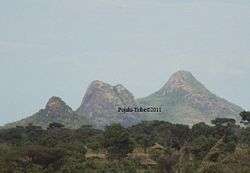
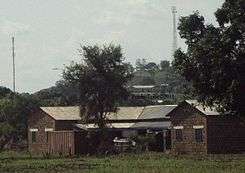
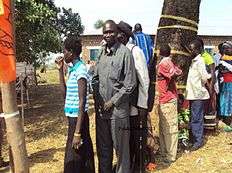
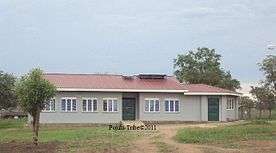
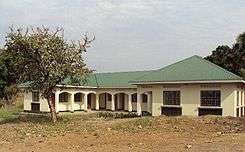
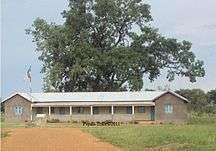
Lainya market
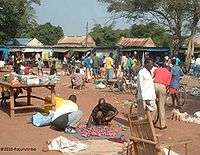
Lainya Market is located in the heart of Lainya Central Business building and embraces many businesses. Operating since 1998 perhaps since 1990 under Sudanese Government, the market provides a vibrant, diverse people from neighbouring counties. The market attracts a diverse range of customers from local shoppers visitors and tourists from Juba, Keji Keji, Morobu and Yei. Visitors come to the market for unusual items that cannot be found in conventional supermarkets and shopping centres across other counties in Central Equatoria.
Environment
Lainya has a healthy environment in comparison to other counties in South Sudan. Air quality is generally good; however woodsmoke from fireplaces is an issue in the winter months. Lainya waterways have historically been affected by heavy pollution from bombs drop government during the civic war. There are no national parks in Lainya; Lainya is bordered by extensive bushland to the far west, east and south sensitive rock lands to the west. There are a number of nearby Mount Park including the Gumbiri Mt, Loka Mt, Biri peak, Kero, Bereka, Gwasere, Lang-koda, Tuli, Arabi, Mondoru'da, Kilingwara, Jolobong, Lukurubang, Kopido, Ka'buu, Kenyi and Baraka peak.
Transport
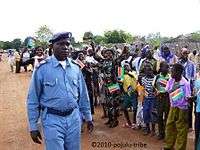
The main mode of transport in Lainya is the road network and the automobile. The Juba road connects Lainya to Yei River County and also to the regional capital city of South Sudan. Lainya is only served by extensive private buses, taxis; motorcycles, trucks and Lorries currently operated along the Juba Yei road.
Education
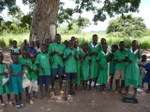
Pupils are learning under mango trees, because the region requires much development due to the devastation done by SPLA/M and NCP. The picture shows some of the local classes for the children who are mostly struggling for their education on the countrysides of Lainya county. Most of the teachers are using what they have learnt "off head" without using books, not because they don't want to, but because there are no books, in some other parts of Equatoria, teachers are relying on East Africa books particularly from Uganda and Kenya which may help in common areas like science, mathematics and English, but when coming into geography it is hard to use.
Economy
Subsistence agriculture is the main economic activity in the county, as is the case with most Sudanese counties. Crops grown include.
- Millet
- Sweet potatoes
- Beans
- Cassava
- cowpeas
- Tomatoes
- Papaya
- ground nut
- Mangos
- Oranges
- Lemons
- Onions
- Simsim
- Banana
- Maize
- Okra
- Honey
- Sorghum
- coffee
See also
- Central Equatoria
- Juba, Sudan
- Mukaya Payam
- Pojulu Tribe
- Yei
- St Peters Yondoru
References
- Full list of Kiir's proposed new 28 states in S Sudan Archived 2016-03-05 at the Wayback Machine Radio Tamazuj
- "Additional 5 counties established in Yei River State". gurtong. Retrieved 2016-08-12.
